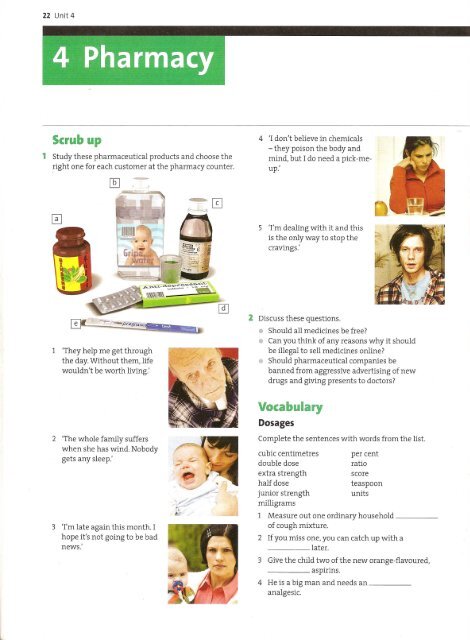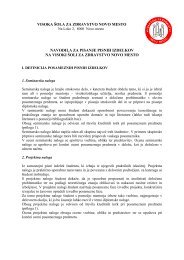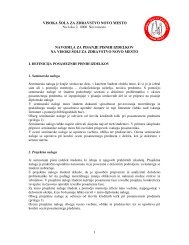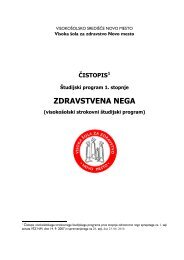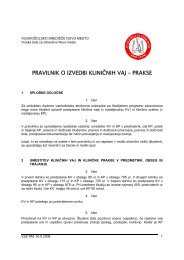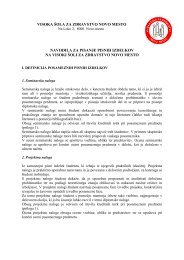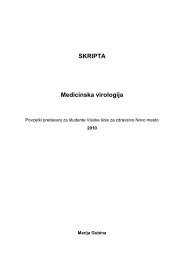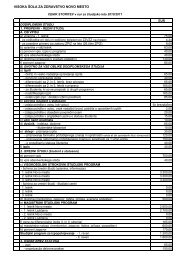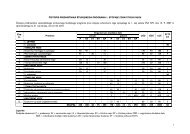Scrub up Vocabulary
Scrub up Vocabulary
Scrub up Vocabulary
- No tags were found...
Create successful ePaper yourself
Turn your PDF publications into a flip-book with our unique Google optimized e-Paper software.
<strong>Scrub</strong> <strong>up</strong><br />
1 Study these pharmaceutical products and choose the<br />
right one for each customer at the pharmacy counter.<br />
4 'I don't believe in chemicals<br />
- they poison the body and<br />
mind, but I do need a pick -me<strong>up</strong>:<br />
5 'I'm dealing with it and this<br />
is the only way to stop the<br />
cravings:<br />
'They help me get through<br />
the day. Without them, life<br />
wouldn't be worth liVing:<br />
2 'The whole family suffers<br />
when she has wind. Nobody<br />
gets any sleep:<br />
3 'I'm late again this month. I<br />
hope it's not going to be bad<br />
news:<br />
2 Discuss these questions.<br />
• Should all medicines be free<br />
• Can you think of any reasons why it should<br />
be illegal to sell medicines online<br />
• Should pharmaceutical companies be<br />
banned from aggressive advertising of new<br />
drugs and giving presents to doctors<br />
<strong>Vocabulary</strong><br />
Dosages<br />
Complete the sentences<br />
cubic centimetres<br />
double dose<br />
extra strength<br />
half dose<br />
junior strength<br />
milligrams<br />
with words from the list.<br />
per cent<br />
ratio<br />
teaspoon<br />
units<br />
1 Measure out one ordinary household _<br />
of cough mixture.<br />
2 If you miss one, you can catch <strong>up</strong> with a<br />
_____ later.<br />
3 Give the child two of the new orange-flavoured,<br />
_____ aspirins.<br />
4 He is a big man and needs an _<br />
analgesic.
In this unit<br />
• units of measurement for medicine<br />
• talking about the effects of medication<br />
• mathematical expressions<br />
• describing a chart<br />
5 The drug is very strong; even just a can<br />
make you drowsy.<br />
6 Make the solution with 100 of insulin.<br />
7 Make <strong>up</strong> a suspension in a of 10:1.<br />
8 Put 3.6 of the powder into a litre of<br />
water.<br />
9 Make a 20 solution with 20 grams of<br />
soluble solid and add enough water to make 100 ml.<br />
10 The patient has a of 9 on the ranking<br />
scale for reactions to drugs.<br />
11 Use a syringe with a volume of 25 _<br />
Patient care<br />
Monitoring the effects of medication<br />
1 Complete the dialogue using the verbs below in the<br />
correct form.<br />
build <strong>up</strong> react stand<br />
discontinue re-evaluate suffer<br />
go away renew tolerate<br />
notice report worry<br />
put on<br />
run out<br />
Mr Thomas<br />
Nurse<br />
Mr Thomas<br />
I want to review your medication, Mr<br />
Thomas. How are you getting on with the<br />
new tablets<br />
They're a big improvement.<br />
Your notes say we started you on Atenolo!,<br />
but you stopped taking it. Did you<br />
_____<br />
1 badly to it<br />
Yes,I felt tired all the time.<br />
Nurse So the doctor tried something different<br />
and you were<br />
2 an alternative<br />
regime. Is that right<br />
Mr Thomas<br />
Yes,I was. That was Captopril. It was no<br />
good either.<br />
Nurse No Did you 3 an allergic<br />
reaction A lot of people<br />
_<br />
having breathing difficulties with that<br />
drug.<br />
Mr Thomas Yes.My mouth and throat swelled <strong>up</strong><br />
-like I was swallowing a tennis ball.<br />
Nurse I see. How about the new medication Do<br />
you 5 any changes in your<br />
body from taking it<br />
Mr Thomas Well, yes. It is affecting my sex life.<br />
Nurse<br />
Mr Thomas<br />
I see. Well, we can't ignore that. We<br />
probably need to 6 your<br />
medication regime and it may be<br />
necessary to 7 this treatment<br />
as well and think about a different one. In<br />
the meantime, how are the headaches<br />
Do they<br />
8 when you use the<br />
new painkillers<br />
The capsules you gave me for the<br />
headaches are great. They're very<br />
powerful and fast-acting.<br />
Nurse Have you 9 of them<br />
Mr Thomas<br />
Nurse<br />
Yes.They're all gone.<br />
I know they are good, but people who take<br />
them 10 a tolerance quite<br />
quickly so they no longer work after a<br />
while. Are you able to<br />
" the<br />
headaches when they come<br />
Mr Thomas Honestly, I can't, they're unbearable.<br />
Nurse If you can't 12 the pain, I think<br />
you'd better go back to the specialist<br />
before we<br />
13 your prescription.<br />
I am starting to 14 about all<br />
these contraindications.<br />
2 Make a list of expressions the nurse uses<br />
1 to ask about side effects<br />
2 to ask about medication history<br />
3 to describe what might happen in the future.
James Lind first introduced 'control' gro<strong>up</strong>s into<br />
experiments in 1747.He studied sailors with scurvy. The<br />
control gro<strong>up</strong> was given their normal food. Other gro<strong>up</strong>s<br />
were given their normal food plus s<strong>up</strong>plements. Lind<br />
found that the gro<strong>up</strong>"receiving oranges and lemons<br />
recovered. What causes scurvy<br />
~O<br />
• Language spot<br />
Mathematical<br />
expressions<br />
1 Complete the mathematical expressions with these<br />
prepositions.<br />
by from of to<br />
1 Five per cent 50 is 2.5.<br />
2 One teaspoon is approximately equivalent<br />
____ 5 millilitres.<br />
3 How much is 7.2kg divided 15<br />
4 Subtract 4litres 13.<br />
5 BAAl equals height divided weight<br />
squared.<br />
6 What do you get when you subtract 52 _<br />
lOa<br />
7 150 mg is added 500 mg to make a total<br />
dose of 650 mg.<br />
8 Three quarters 100 litres equals 75.<br />
2 In the mathematical expressions above, identify one<br />
conversion and one formula.<br />
3 Iij) Listen and match what you hear with the sums<br />
written below. Write a-h. Each sum has two spoken<br />
versions.<br />
4<br />
1 3 mg+ 6 mg = 9<br />
2 36 ml = 9<br />
4ml<br />
3 13 litres - 4litres = 9<br />
4 3 mgx 3 mg = 9<br />
Iij) Listen and write what you hear in numbers<br />
symbols.<br />
and<br />
5 Work in pairs. Read aloud mathematical expressions<br />
for your partner to write down in numbers and symbols.<br />
Student A, go to p.1lO.<br />
Student<br />
B,go to p.113.<br />
»Go to Grammar reference p.ll8<br />
Reading<br />
Drugs testing<br />
1 Do this questionnaire on attitudes to drugs testing<br />
and compare your responses with other students.<br />
Testing drugs<br />
on animals is<br />
unnecessary<br />
and wrong.<br />
Before testing<br />
them on others,<br />
researchers<br />
should test<br />
new drugs on<br />
themselves.<br />
Scientific<br />
progress is<br />
more important<br />
than the lives of<br />
a few people.<br />
strongly<br />
strongly<br />
agree agree disagree disagree<br />
,<br />
2 Read the text and answer the questions.<br />
lOne reason why there is a constant need to develop<br />
new drugs is because new illnesses are appearing<br />
all the time. What are three other reasons<br />
2 In a clinical trial, first the drugs are tested on<br />
animals. What are the next two main steps<br />
3 What is the basis of the Nuremberg code<br />
4 Which two gro<strong>up</strong>s of people may not always be<br />
able to make a free choice over participating in<br />
clinical trials<br />
5 There are risks for sick people participating in<br />
clinical trials, but what are the benefits<br />
6 What ethical problems may arise when scientists<br />
believe very strongly in the importance of their<br />
research<br />
3 Think about the principle of informed consent and<br />
discuss the questions.<br />
1 Why do most clinical trials exclude pregnant<br />
women<br />
2 There's scientific evidence that a positive attitude is<br />
necessary for any cure to work. If there is only four<br />
per cent chance of benefiting from a drug being<br />
trialled, should you inform trial participants of this
Ethical dilemma: when you are faced with a moral choice.<br />
For example, a student nurse sees a very senior colleague<br />
break a basic hygiene rule. The student nurse faces an<br />
ethical dilemma. Should he do something or stay qUiet<br />
Do something 0 Stay quiet 0 Depends 0<br />
\Ethics and the search for<br />
cures I<br />
I<br />
III<br />
There is a constant need for new<br />
drugs.This is because there is a<br />
lot we don't know about human<br />
biology, there are still many illnesses we<br />
cannot cure, and new illnesses appear all<br />
the time while existing medicines lose their<br />
effectiveness. New drugs are tested on<br />
animals, but because animals' bodies work<br />
differently from ours, if a drug works on<br />
a caged rat, it does not mean that it will<br />
do the same for a human being.The only<br />
way to really know about a new medicine<br />
is to test it on people in a clinical trial.This<br />
is done by first giving it to healthy people<br />
to see if it is safe, and then giving it to sick<br />
people to see if it works.<br />
Anyone participating in a clinical trial<br />
must understand the risks and give their<br />
informed consent.This is a principle of the<br />
Nuremberg code resulting from the cruel<br />
experimentation done in prison camps<br />
during the Second World War Informed<br />
consent prevents abuse of people in the<br />
name of science, but the problem is that if<br />
you apply the principle literally,you cannot<br />
do research on children, people with<br />
Alzheimer's disease, and the mentally ill.<br />
Prisons provide controlled environments<br />
and constant s<strong>up</strong>plies of participants for<br />
drugs trials. However, the fact that prisoners<br />
often agree to do things they would not<br />
normally do (such as being deliberately<br />
infected with dangerous diseases) in<br />
exchange for certain rewards, raises the<br />
question of whether they make genuinely<br />
free choices. The same goes for people living<br />
in extreme poverty whose need for money<br />
may blind them to the risks involved.<br />
Sick people participating in a trial benefit<br />
by being the first to get a new treatment<br />
and a lot of attention. However, there are<br />
risks. By taking a brand new medicine,<br />
they enter an unknown area in which it is<br />
possible for things to go badly wrong. When<br />
little is known about them, the use of some<br />
drugS'like Thalidomide, and more recently<br />
TGN 1412, can lead to disablement and<br />
death.<br />
The other ethical issue concerns the<br />
judgement of the doctors and nurses<br />
working on trials. As healers, their primary<br />
concern is for the well-being of their<br />
patients, but there may be times when,<br />
convinced by the importance of their<br />
work and the benefits it could bring to<br />
society, they give the experiment greater<br />
importance than the patients. In one<br />
famous study in America, hundreds of<br />
men with syphilis were left untreated, even<br />
after a cure was discovered, in order that<br />
researchers could study the effect of the<br />
disease right <strong>up</strong> until death.<br />
Speaking<br />
Ethical dilemmas<br />
and medicine<br />
1 Student A, go to p.1lO. Student B,go to p.m. You will<br />
each read two situations which set ethical dilemmas.<br />
Answer the questions.<br />
2 Make a prediction of how your partner would answer<br />
the same questions.<br />
3 Work in pairs. Close this book. Set the ethical<br />
dilemmas you have read for your partner. Ask the<br />
same questions and find out if your predictions were<br />
right.<br />
4 Explain why you made your predictions and explain<br />
your own responses to the ethical dilemmas.
During a follow-<strong>up</strong> appointment, a practice nurse asked a patient<br />
how he was getting on with his medication patches. 'The doctor<br />
told me to put on a new patch every six hours and now I'm<br />
running out of places to put them,' he said. The nurse asked him to<br />
undress and saw that the man had fifty patches stuck on his body.<br />
Write one sentence that gives instructions for using the<br />
medication patches that could not be misunderstood.<br />
Listening<br />
A clinical trial<br />
1 (;) Listen to a participant in a clinical trial talk to a<br />
nurse who is monitoring responses to a new drug.<br />
Answer the questions.<br />
1 Which (a, b, or c) is the patient's self-monitoring<br />
chart<br />
Tests<br />
Side effects<br />
1 Stuay the chart shOWing side effects experienced by<br />
participants testing a sedative in a clinical trial.<br />
SIDE EFFECTS EXPERIENCED BY TRIAL PARTICIPANTS<br />
60<br />
tl c<br />
'"<br />
CL<br />
:e 30<br />
'" CL<br />
o<br />
I ~ 20<br />
• Hypersensitivity<br />
• Numbness<br />
• Stomach problems<br />
• Weight loss<br />
• Weight gain<br />
Headaches<br />
Tiredness<br />
• Depression<br />
• Hyperactivity<br />
I<br />
I 10<br />
• Severe pain<br />
• Moderate<br />
Pain free<br />
pain<br />
2 What are the eligibility criteria for participating in<br />
this trial<br />
3 How is the trial inconvenient for the participant<br />
2 (;) Listen again and complete the monitoring form.<br />
CITY HOSPITAL<br />
Monitoring form<br />
I<br />
2 Complete the description of the chart with the names<br />
of side effects.<br />
The most common side effect was 1. This<br />
was reported by sixty per cent of the participants,<br />
double the number who experienced periods of<br />
2<br />
Half the total number of participants suffered<br />
3 and out of every hundred participants,<br />
twenty complained of 4 . This is four times<br />
the number who experienced periods of _<br />
The number of participants who experienced<br />
.. _ . ..6 was statistically insignificant. A number<br />
of participants experienced changes in their BMl.<br />
7 was the most common at a ratio of five<br />
to one with _<br />
3 Read the information about two more symptoms and<br />
add blocks to the chart.<br />
Reports of drowsiness came from forty-five<br />
participants in every hundred. This was nine times as<br />
many people who reported hallucinations.


